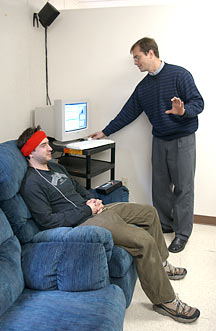Table of Contents
Turn Left in Bismarck, and Go Until…
Relax! We Have New Labs for That
Fieldwork Across the Curriculum:
Update on ISEI
Letter from James Costopoulos '83
Relax! We Have New Labs for That
By Sarah Cook ’03Two new psychology laboratories, one devoted to sleep and one to sports psychology, expand students’ opportunities for research.
A Dream Come True
The Sleep and Circadian Rhythms Laboratory“I have been waiting for this opportunity for 10 years,” says Assistant Professor of Psychology Pamela Thacher, the head of the department’s new Sleep and Circadian Rhythms Laboratory. “It’s been a dream of mine to be able to do this sort of research.”
Dreams aren’t the only things Thacher and her students will be able to delve into in the new lab. “’Circadian’ means the biological variations that take place within a 24-hour span,” says Thacher, “and the lab will let us study sleep rhythm and performance as part of that cycle.”
Psychology major Renee Ciulla ’03 of Weare, N.H., says, “There is a lot of information on sleep out there, but if we can do our own studies here at St. Lawrence we could be on the cutting edge.” Thacher says she thinks it would be valuable if students were exposed to sleep more in terms of health. Most students, she says, don’t get enough sleep, and alcohol affects dream and R.E.M (deep) sleep, making it even harder to get a good night’s sleep and feel rested in the morning, she explains.Performance Evaluation
The Sports Psychology Laboratory
In the new Sport Psychology Lab, Assistant Professor of Psychology Artur Poczwardowski, standing, and Marcus Perman '03, work with a Peak Achievement Trainer (PAT), a neurofeedback device that monitors a person's ability to concentrate on a task. As we walk into a room filled with navy blue reclining chairs, Assistant Professor of Psychology Artur Poczwardowski tells me I’m looking at part of St. Lawrence’s new Sport Psychology Laboratory. “There are not many labs like this in the country,” he says. “We’re devoted entirely to sport psychology, and to how psychology applies to other areas of performance.” He points out computerized music files for energizing and relaxation purposes, a sport psychology music library, and the recliners, which are used for imagery exercises.
Poczwardowski says he favors testing sound theoretical principles in a practical setting that emphasizes “ecological validity,” or real-life situations. He describes an intervention study that used psychological skills to teach pre-performance routines to the men’s basketball team and help them visualize free throws. The players who had undergone the sport psychology program in which they “saw and felt” themselves using proper form and making their free throws showed improvement both in free throws and in confidence compared to athletes who did not take part in the exercise, he explains.
Women’s head soccer coach Deb Biche adds, “As a coach, you are always looking for the element that will give you an edge over your opponent. The ‘mental edge’ is of the utmost importance in athletics and at times the most difficult to maintain. The addition of a sports psychology lab offers students, faculty, athletes, and coaches another resource in the development of mental performance.”
